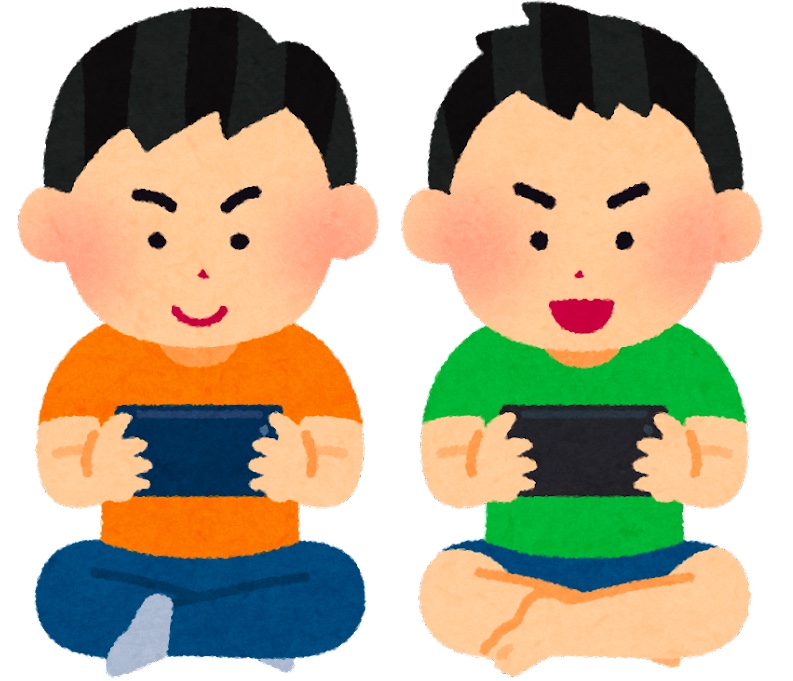Japanese people love mobile games. The amount of money charged per capital is also the highest in the world.
Many of the so-called “smart phone walkers” or people who were late getting off the train must have been addicted to mobile games.
So, let us look at the reasons why Japanese people enjoy mobile games.
The demographic that was not familiar with games changed drastically once they got a smartphone
The characteristics of mobile games, as well as the fact that they are popular among Japanese people, can be found primarily in the fact that they are played on smartphones.
Needless to say, smartphones are multifunctional. This means that even people who were not interested in playing games prior to the introduction of smartphones will change their mind once they own one.
Cell phones in the late 1990s didn’t have much functionality, but at some point they came with cameras, which are now standard on smartphones as well.
This made photography easier than ever before, and the photography culture became much more widespread than it had been in the days of dedicated cameras.
This can be seen in the popularity of Instagram and Twitter.
The gaming market has also expanded along with smartphones.
Game consoles can only be used as game consoles, smartphones, on the other hand, have a wide range of functions and can be used for a variety of purposes even if they are no longer used for gaming.
Mobile games have an appeal that high-end games do not have
In general, mobile games are not as advanced as cutting-edge home video games or PC games in terms of graphics, gameplay, and operability.
The PlayStation 5 is a good example.
It is unsurprising that the performance of a smartphone, which is small and has other uses aside from gaming, and the PS5, which is a dedicated game console, are vastly different.
The characteristics of mobile games are as follows
- (1) You can play games without buying a dedicated game console or a gaming PC.
- (2) You can effortlessly begin playing games by having to download them rather than purchasing game software.
- (3) Easy to play even in small time slots
- (4) At each event, there is excitement, competition, and a never-ending sense of anticipation
- (5) the pleasure of being involved with others and showing off to others
- (6) easy to win, lose, have relationships, and quit the game
- (7) Even if the game is simple, if the presentation is appealing, you will be drawn in.
- (8) even the effects are collectible
To explain 1-3 of the above features, first of all, to enjoy PS5 games, you need a PS5 console, software, a TV, and a power supply.
However, mobile games can be started with a single smartphone and no software is required.
Even if you must download software to play the game, there are many instances where the basic game is free.
This type of system encourages more people to try the game in any case.
Sense of competition at each event
In the first place, home video game software has a sense that once you see the ending, that is the end of the game.
Of course, players are free to continue playing after that point, but they are limited to what was included in the software when they purchased it.
However, in the mobile game, the operator will update the software so that everyone will not get bored.
In terms of new features, the operators also hold events on a regular basis to increase participation and charge rates. This is done to motivate the players.
There may be a sudden service termination for the convenience of the game operator in this type of game, but there are no endings like in home video games.
This sense of never-ending fun is difficult to replicate in home video games.
Mobile games fill a gap in the Japanese mind
Next, let us look at causes that are in line with the characteristics of modern Japanese society. The reason for this is that people today have somewhat strained interpersonal relationships. Academically, the deterioration of human relationships is attributed to economic development and the nation’s urbanization.
It is doubtful, then, that today’s Japanese are looking for close personal relationships.
For example, today’s young business people seem to dislike the strong relationships they have within their companies, such as drinking parties and company trips.
People today, on the other hand, dislike the idea of having no relationships at all. In fact, Internet services for matching friends and lovers are thriving in and of themselves.
In other words, Japanese people want “casual (loose) connections” with like-minded people in their favorite categories.
By “easy connections”, we mean that it is easy to establish relationships and easy to break off relationships.
In this regard, Twitter makes it simple to add and remove followers, and communities within mobile games are typically simple.
Conversations can become more animated when they are based on games they enjoy playing together. Working people need to interact with people they don’t like, but traditional Japanese corporate relationships are too restrictive, which is probably why they prefer mobile games.
Gambling
Japanese people like to gamble.
Or, to be more precise, Japan is an environment that brings out the love of gambling in people. The symbol of this is pachinko and pachislot. This is because pachinko parlors operate at high rates in front of train stations in urban areas and along main roads in regional cities throughout Japan.
And as is well known, mobile games are also full of gambling-like elements called gacha.
Gacha is a lottery-style purchase of items that is usable in games.
Gacha has the benefits of not knowing what you will get and the disadvantage of having to keep charging until you get the item you want.
Recently, some mobile games offer Amazon gift certificates for winning the top game or winning the lottery.
While this is a practical advantage, it is inefficient in light of the time and money required to reach the highest level of the game.




Comments